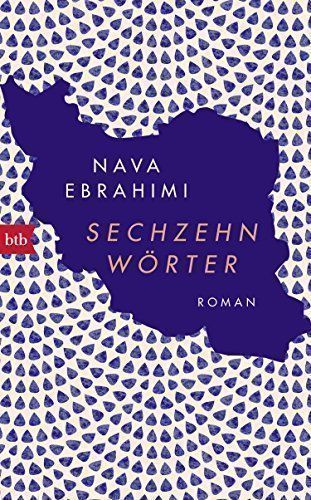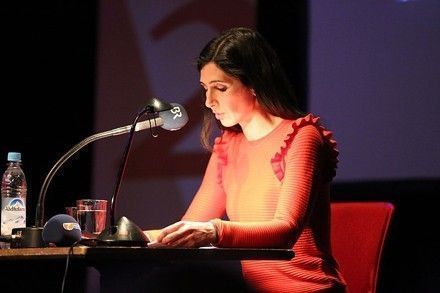By Behjat Omid
A wave of titles by second-generation German-Iranian authors is making its way into German bookstores.

Critically acclaimed releases include Nava Ebrahimi’s “Sechzehn Worter” (“Sixteen Words”), Shida Bazyar’s “Nachts ist es Leise in Tehran” (“Tehran is Peaceful at Night”) and Mehrnoush Zaeri Esfahani’s “33 Bogen Und Ein Teehause” (“33 Bridges and a Tea House.”)
Most of these young writers left Iran with their families at a young age after the 1978-79 Islamic Revolution. They all write in German. They recount childhood memories of Iran, describe everyday life in Germany, and evoke their internal struggles, family dynamics and culture clashes. Their inner universe is dominated by insecurity, doubt and instability.
The characters in these books are often somewhat indifferent to the tumultuous events around them. They are driven chiefly by the search – conscious or unconscious – for their national identity.
Mona is the protagonist of Nava Ebrahimi’s novel “Sixteen Words.” She is a 30-year-old journalist who travels with her mother from Cologne to Iran to attend the funeral of her grandmother. She visits Mashhad and Bam. Mona tells the story of three generations of women confronting life in Iran and Germany.
Ebrahimi was born in 1978 in Tehran. She later moved to Germany, where she studied journalism and economics in Cologne. For a time, she wrote for the German edition of the Financial Times. Ebrahimi’s short stories have been published in German magazines. “Sixteen Words” is her first novel. The following is a conversation with the author conducted recently in Germany.
You’ve been referred to both as a German-Iranian author and a second- generation German writer. How would you describe yourself?
I have no problem being known as an Iranian writer. I introduce myself as one when I’m outside Iran. But when I hear the label ‘German author,’ I think of Thomas Mann, Gunter Grass or Martin Walser.
My novel doesn’t need a label. I’m not a German author. This may change in the future, as contributions by dual-national writers enrich German literature. I prefer to be defined as a second-generation Iranian writer.
The main character in your novel is an astute woman who is also a passive observer of circumstances around her. She makes no effort to influence events and her environment. Should we attribute this to her childhood experience as an immigrant in Germany? She’s had a turbulent life after all.
Mona’s inertia stems from her insecurity. She is unable to deal with her internal contradictions. She is a prisoner of irreconcilable opposites that prevent her from managing her life intelligently and effectively. Mona doesn’t know herself, and can’t find her path in life. She has no plans, and floats aimlessly through life. She is unwilling to learn from her parents’ experience as immigrants. Besides, she has to deal with problems that are peculiar to people her age, namely living in a big city, lack of job security and loneliness.
To what extent does Mona, the character in your novel, represent the young generation of German-Iranians?

I’m not comfortable calling someone the voice of a generation. I wouldn’t have been able to write this story if that was my intention. It wasn’t until I’d finished writing this novel that I thought: how nice it would be if the reader were to feel exactly how I do when I read a book that I like.
Mona is from Cologne, has a multilayered personality, and likes to party. Like other young journalists, she leads a tough and financially challenging life. She also has a lot in common with other German-Iranian youths. In many ways, her life parallels that of other Iranians living in Germany. They struggle, feel extremely attached to their adopted country, yet are inexplicably drawn to the land of their ancestors. Within the family dynamic, this translates into craving for independence while trying to maintain the sanctity of one’s Iranian family.
Why did you choose the title “Sixteen Words?”
I spent a great deal of time trying to find a title that would encapsulate Mona’s life, and give a sense of her dual nationality – her feeling of alienation both in Germany and in Iran. I also gave Mona’s relationship with her parents as well as her various love interests a lot of thought. These 16 words allowed me to connect the dots and move the story forward.
Do you write for a German or an Iranian readership? What specific thoughts do you wish to share with readers?
To be honest, I don’t try to convey a particular thought to my readers. I needed to write this novel, so I did. I wanted to give a sense of the Iranian psyche to my German readers, in the hope that they would develop a greater appreciation for Iranians’ sense of humor and their compassionate nature. The media doesn’t give an accurate image of Iran and Iranians.
#navaebrahimi #sixteenwords #germany #germaniranian#germanauthor #bestseller #iranianauthor #debutnovel #iran#booksaboutiran #islamicrevolution #kayhanlife

